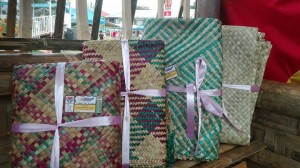 Bukidnon – The Department of Social Welfare and Development takes part on this year’s Kaamulan Festival. “Kaamulan” is from the Binukid word “amul” which means “to gather”.
Bukidnon – The Department of Social Welfare and Development takes part on this year’s Kaamulan Festival. “Kaamulan” is from the Binukid word “amul” which means “to gather”.
A gathering, which showcases the unique indigenous culture of Bukidnon, is held annually at the heart of Malaybalay City. The identified activities reflect meaningful ceremony of the richness and diversity of the Bukidnon culture, designed to fuse the different sectors of the provincial community as a whole.
Every year, the province also holds a Kaamulan Trade Fair wherein participating municipalities, business sectors and other agencies are given booths for display of products and services.
As for the Project Development Officers of the Sustainable Livelihood Program (SLP) in Bukidnon, they see this event as an opportunity to showcase the fruit of their service in the area. Ms. Leah Viray, Cluster Coordinator says, “Our cluster group takes this initiative to avail one booth wherein we could display livelihood products and services of our program participants”. “Also to show support since they have very limited access to large market and encourage them as well to strive further in order to progress and achieve an improve quality of life”, she added.
The livelihood booth will feature various food products of Kibawe and Valencia, unique artifacts, furniture’s and indigenous products or accessories from Kitaotao, Dangcagan, Maramag, Pangantucan and other nearby municipalities.
On the other hand, the booth shall also feature a massage services and a mini salon which will be staffed by our beneficiaries who are graduates of the technical vocational courses on Massage Therapy NCII and Beauty Care NCII last May 2015 at Quezon, Bukidnon. Selected staff will take turns in providing these services along the duration of the trade fair.
The Kaamulan Trade Fair officially opens last October 1 and expected to culminate at the end of the same month or beyond, depending on the demand of the community.
Bukidnon is a home of 6,063 SLP beneficiaries.
Written by Jamila M. Taha, DSWD


